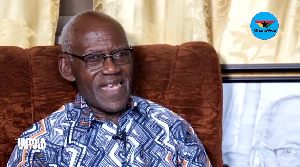- Home - News
- TWI News | TV
- Polls
- Year In Review
- News Archive
- Crime & Punishment
- Politics
- Regional
- Editorial
- Health
- Ghanaians Abroad
- Tabloid
- Africa
- Religion
- Election 2020
- Coronavirus
- News Videos | TV
- Photo Archives
- News Headlines
- Press Release
General News of Saturday, 9 March 2013
Source: GNA
Ghana observes 10 years of the APRM process
The African Peer Review Mechanism (APRM) ensuring that policies and practices of member states conform to the values, codes and standards contained in the NEPAD programme, commemorates its 10th Anniversary today March 9.
Ghana is observing the anniversary with commitment to step up the awareness creation of the APRM process nationwide, particularly at grassroots. This will be done alongside assessing progress made and challenges in the implementation of the APRM National Programme of Action.
Planned activities include television and radio debates on the APRM process, panel discussions, symposium at selected national universities, students’ competitions and music or cultural performance.
Professor Samuel K.B. Asante, Member, African Peer Review Mechanism (APRM) Governing Council, briefing the media in Accra on Friday explained that the APRM represented a unique home-grown African-led and operated instrument voluntarily acceded to by African Union member states as a self-monitoring mechanism for participating countries.
The APRM was established on March 9, 2003 as a manifestation of the will and determination of African leaders and its people towards achieving common objectives to uphold the rule of law, respect for human rights, democracy, transparency and good governance.
Prof. Asante said since its inception, the APRM had made significant progress in terms of the numbers of countries that had acceded, the rolling out of the review exercise, the deepening of the review process as well as the level of participation and engagement of stakeholders.
He said the celebrations would also help to assess the impact of the APRM in peer reviewed countries and explore ways of strengthening partnerships among all stakeholders including government, the public, private sector and development partners.
Mr Ashraf Rashed, leader of the Ghanaian African Peer Review (APR) Panel of Eminent Persons, stated that Ghana’s accession to the APRM programme had opened the space for citizens participation in policy debates and foster national dialogue.
He said the increased advocacy for good governance and better services delivery was an important element in the African Union Governance Architecture.
Mr Rashed said despite ten years of its existence, the APRM was largely unknown to the majority of the people in Africa and also faced challenges in the implementation of the recommendation made during the peer reviews.
“Certainly, all of us need to redouble our efforts to ensure national ownership, enhance inclusive process for all stakeholders involving the society, private sector and government, and improve the process of outreaching the grassroots as well as the credible implementation emanating from the reviews” he added.











